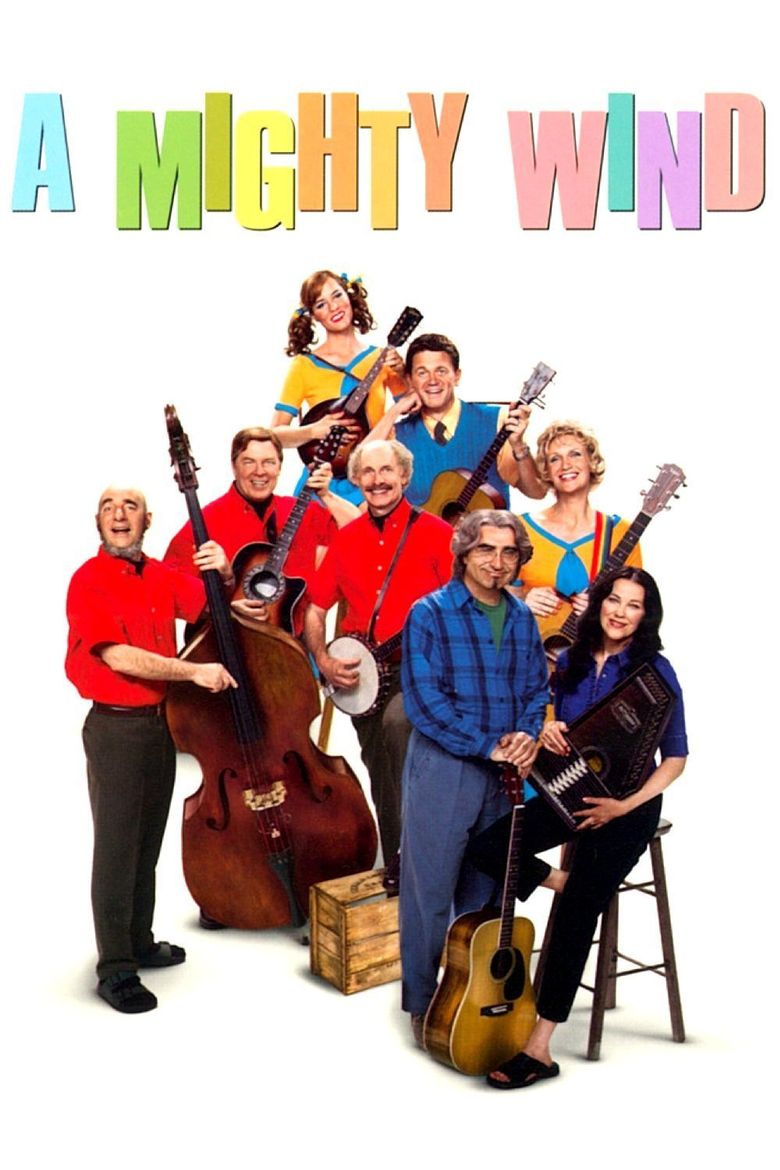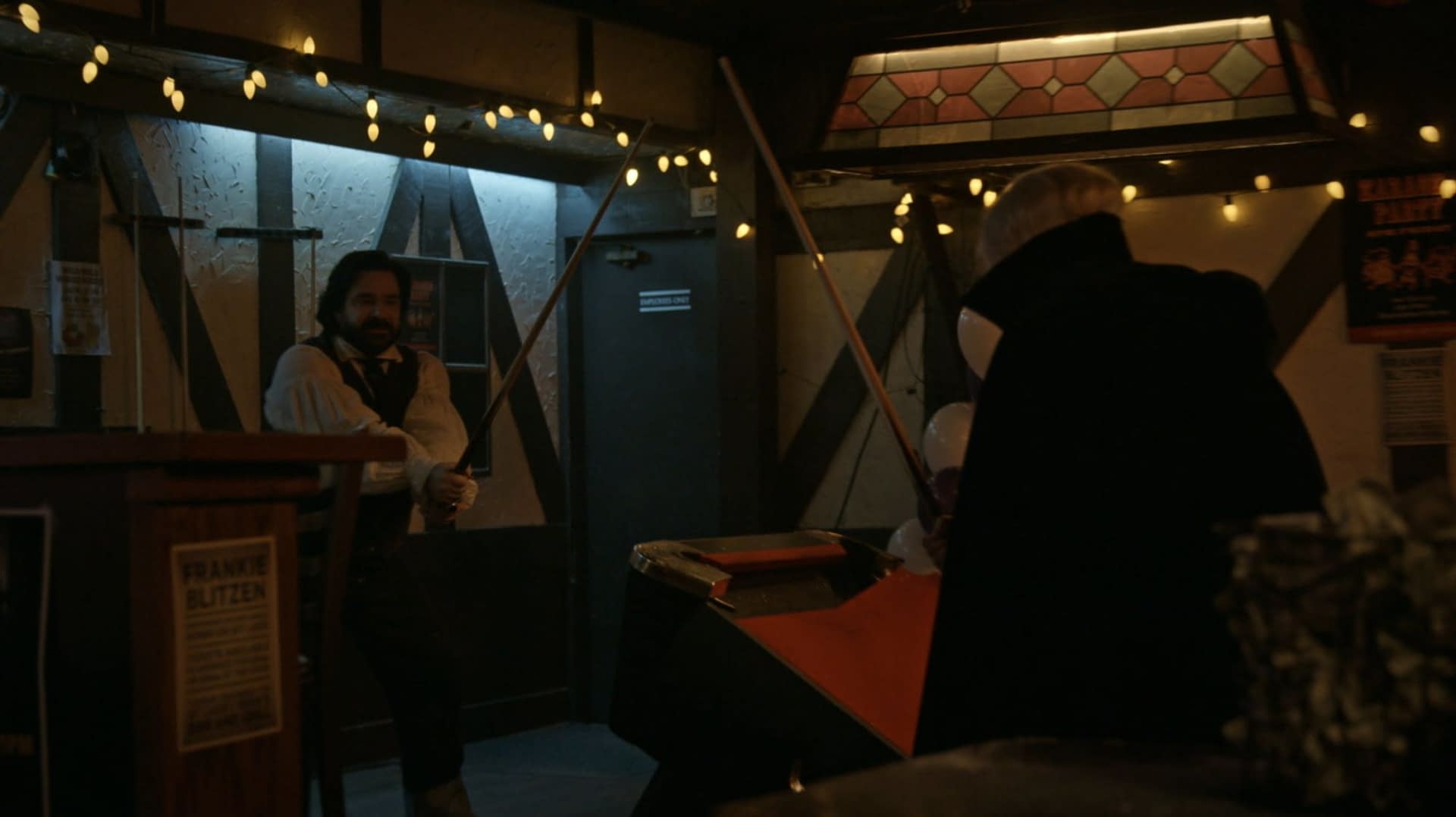Director: Christopher Guest
Really funny mockumentary from arguably the genre's most accomplished practitioner, Christopher Guest.
A Mighty Wind is a fake, humorous documentary that chronicles the organization and execution of a commemorative reunion of folk musical acts, following the death of an influential producer who had been connected to the performers. Through interviews and Ken Burns-style still photos, bands with names like Mitch and Mickey, The Folksmen, and The New Main Street Singers tell of their own rises to fame during the 1960s, when the form was at its peak and their acts were on top of the popular music world. Not long after their heydays, though, all of the groups broke up, disbanded, or underwent large-scale personnel changes. So they all face the challenge of overcoming past divisions and grudges, in order to put on a reunion performance that isn't an embarrassing farce.
While I haven't seen all of Christopher Guest's documentaries, I've seen and loved his best-known ones for years. This is Spinal Tap and Best in Show are tough to top, in terms of phony documentary comedies. Still, there are others of his that I'd never seen. My wife and I watched the first 15-odd minutes of his scripted comedy For Your Consideration, but it didn't grab us. We jumped over to A Mighty Wind and found exactly what we were looking for. I don't find it quite as good as Spinal Tap or Best in Show, but it's not far behind.
The subject matter of folk musicians was a great choice. While the movie exaggerates the scale of folk music's popularity in the 1960s a tad for comedic effect, the fun part of it is making these popular groups exceedingly corny and sappy, even when singing about intensely dark topics (not unlike some very real folk groups of past and present). I'm fairly sure that the actors did a fair bit of their own playing and singing, but whoever did it was pretty great. As funny as the lyrics are, the actual musicianship is solid, which just makes the hokey words and sentiments that much funnier. It's sort of like having a really good "straight man" off of whom the "funny man" comedian gets their laughs.
This was a really enjoyable entry into the mockumentary canon. I only which I'd seen it sooner.
Really funny mockumentary from arguably the genre's most accomplished practitioner, Christopher Guest.
A Mighty Wind is a fake, humorous documentary that chronicles the organization and execution of a commemorative reunion of folk musical acts, following the death of an influential producer who had been connected to the performers. Through interviews and Ken Burns-style still photos, bands with names like Mitch and Mickey, The Folksmen, and The New Main Street Singers tell of their own rises to fame during the 1960s, when the form was at its peak and their acts were on top of the popular music world. Not long after their heydays, though, all of the groups broke up, disbanded, or underwent large-scale personnel changes. So they all face the challenge of overcoming past divisions and grudges, in order to put on a reunion performance that isn't an embarrassing farce.
While I haven't seen all of Christopher Guest's documentaries, I've seen and loved his best-known ones for years. This is Spinal Tap and Best in Show are tough to top, in terms of phony documentary comedies. Still, there are others of his that I'd never seen. My wife and I watched the first 15-odd minutes of his scripted comedy For Your Consideration, but it didn't grab us. We jumped over to A Mighty Wind and found exactly what we were looking for. I don't find it quite as good as Spinal Tap or Best in Show, but it's not far behind.
The subject matter of folk musicians was a great choice. While the movie exaggerates the scale of folk music's popularity in the 1960s a tad for comedic effect, the fun part of it is making these popular groups exceedingly corny and sappy, even when singing about intensely dark topics (not unlike some very real folk groups of past and present). I'm fairly sure that the actors did a fair bit of their own playing and singing, but whoever did it was pretty great. As funny as the lyrics are, the actual musicianship is solid, which just makes the hokey words and sentiments that much funnier. It's sort of like having a really good "straight man" off of whom the "funny man" comedian gets their laughs.
This was a really enjoyable entry into the mockumentary canon. I only which I'd seen it sooner.



